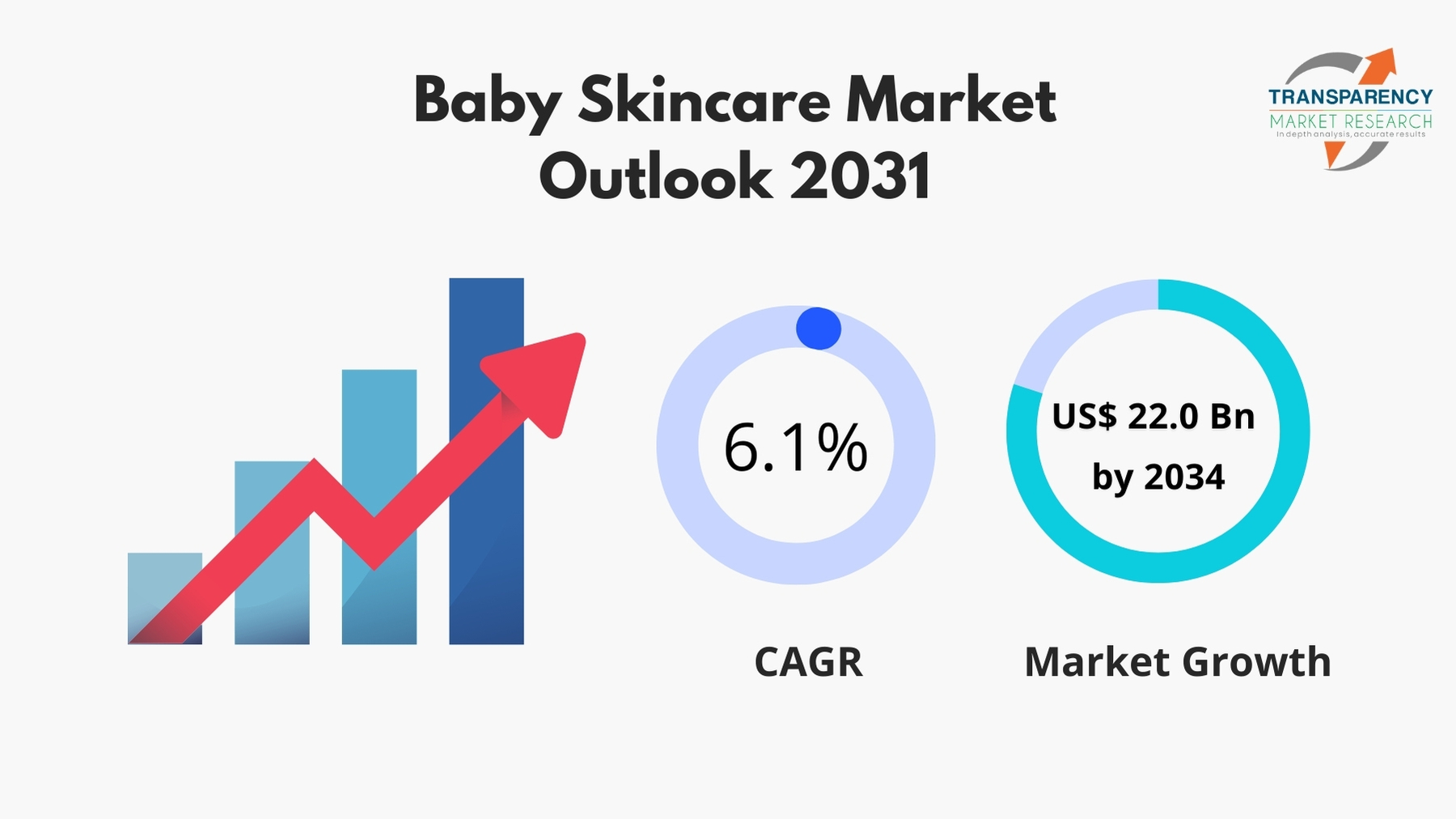Wilmington, Delaware, Transparency Market Research Inc. –, Jan. 20, 2025 (GLOBE NEWSWIRE) -- The global baby skincare market (mercado del cuidado de la piel del bebé ) is on a growth trajectory, poised to reach a valuation of US$ 22.0 billion by 2034, up from US$ 11.6 billion in 2023. With an estimated CAGR of 6.1% between 2024 and 2034, the industry is flourishing due to increased awareness of infant skin health, higher disposable incomes, and the rising preference for organic and chemical-free products.
As urbanization expands and birth rates remain robust in emerging markets, particularly in Asia Pacific, the baby skincare sector is evolving to cater to more discerning parents. These trends, combined with the rapid growth of e-commerce platforms, have made baby skincare products more accessible than ever.
For a detailed analysis of Market Dynamics, trends, and Competitive strategies, Request a Sample Report - https://www.transparencymarketresearch.com/sample/sample.php?flag=S&rep_id=84223

Baby Skincare Market Industry Highlights
The baby skincare market encompasses a wide range of products designed specifically to meet the unique needs of infant skin. These products include lotions, creams, oils, powders, soaps, shampoos, and wipes, all formulated to be gentle, safe, and effective.
Parents are increasingly prioritizing quality and safety when purchasing baby care products, driven by concerns over the harmful effects of synthetic chemicals on delicate baby skin. This has led to a growing preference for natural, organic, and hypoallergenic formulations.
Key Drivers of Growth
1. Rising Parental Awareness and Concerns
Today's parents are more educated and informed about the potential risks of synthetic ingredients in baby skincare products. Increased access to information through digital platforms has empowered them to make better choices for their children.
Consumers are seeking products that are:
- Free from harmful chemicals like parabens, sulfates, and artificial fragrances.
- Dermatologically tested and recommended by pediatricians.
- Enriched with natural ingredients such as aloe vera, chamomile, and shea butter.
2. Organic and Plant-Based Product Trends
The demand for organic and plant-based baby skincare products is surging, reflecting a broader shift in consumer behavior across the personal care industry. These products, often marketed as chemical-free, non-toxic, and environmentally friendly, are becoming a go-to choice for parents.
Brands that emphasize eco-conscious packaging and sustainable practices are also gaining favor. For instance, biodegradable baby wipes and recyclable containers resonate strongly with environmentally conscious consumers.
3. Boom in e-Commerce and Digital Platforms
The rise of e-commerce has revolutionized how baby skincare products are purchased. Online platforms offer:
- Convenience: Parents can shop anytime, from anywhere.
- Variety: A vast selection of products and brands is available at their fingertips.
- Transparency: Customer reviews and product information help buyers make informed decisions.
Leading e-commerce players, such as Amazon, Walmart, and Flipkart, alongside niche marketplaces specializing in baby care, are driving this shift.
4. Increasing Birth Rates in Emerging Markets
Emerging economies, particularly in Asia Pacific, are witnessing significant population growth and rising disposable incomes. Countries like India and China are expected to lead the market, with a large base of young parents seeking high-quality baby skincare products.
Government initiatives promoting infant health and hygiene, coupled with urbanization, are also contributing to this demand.
Get Customized Insights & Analysis for Your Business Needs: https://www.transparencymarketresearch.com/sample/sample.php?flag=S&rep_id=84223
Key Market Trends in Baby Skincare
1. Focus on Hypoallergenic and Dermatologist-Approved Products
Products labeled as hypoallergenic or dermatologist-approved are gaining traction. Parents are willing to pay a premium for products that promise safety and efficacy, especially for babies with sensitive or allergy-prone skin.
2. Expansion of Premium and Niche Product Lines
The rise of affluent consumers has led to a growing demand for premium baby skincare products. Brands are introducing niche offerings, such as:
- Organic baby oils infused with lavender or calendula.
- Ultra-moisturizing creams for dry climates.
- Sun protection lotions designed specifically for infants.
3. Innovative Packaging Solutions
Convenience in packaging is another emerging trend. Products like single-use sachets, travel-size containers, and pump bottles are highly favored by busy parents.
4. Gender-Neutral and Inclusive Marketing
Brands are increasingly adopting gender-neutral marketing strategies, focusing on the universal needs of babies rather than segmenting products by gender.
Competitive Landscape
The baby skincare market is highly competitive, with both multinational corporations and local players striving to capture market share.
Key Market Players
- Johnson & Johnson: A global leader known for its trusted baby care products, including lotions, oils, and powders.
- Procter & Gamble (Pampers): Focuses on innovative baby skincare wipes and hygiene products.
- Unilever (Dove Baby): Offers mild and moisturizing products for sensitive baby skin.
- Himalaya Wellness: A pioneer in herbal and natural baby care products.
- The Honest Company: Popular for its plant-based and chemical-free skincare range.
- Mustela: Specializes in dermatologically tested products for newborns and infants.
Recent Developments
- Johnson & Johnson launched an eco-friendly product line in 2023, featuring biodegradable wipes and sustainably sourced ingredients.
- The Honest Company expanded its distribution network in Asia in 2024, aiming to tap into the growing demand for organic baby products in the region.
- Himalaya introduced a new baby lotion with 100% herbal actives, targeting consumers in emerging markets.
Regional Insights
1. Asia Pacific
- Market Share: The largest and fastest-growing region, driven by high birth rates and rising disposable incomes.
- Key Markets: India, China, Indonesia.
- Consumer Preferences: Affordable yet high-quality products with natural ingredients.
2. North America
- Market Share: Significant due to strong brand presence and consumer willingness to pay a premium for quality.
- Trends: Organic and hypoallergenic product lines dominate.
3. Europe
- Market Share: Stable growth driven by sustainability-focused consumers.
- Trends: Emphasis on cruelty-free and eco-friendly packaging.
4. Middle East & Africa
- Market Share: Emerging market with potential for rapid growth.
- Key Drivers: Urbanization, increasing birth rates, and awareness of baby hygiene.
Challenges in the Baby Skincare Market
While the market shows robust growth potential, several challenges persist:
- Stringent Regulatory Compliance: Companies must navigate complex regulations governing product safety and labeling.
- High Competition: The influx of new brands has intensified market competition.
- Consumer Skepticism: Misinformation about product ingredients can impact consumer trust.
Key Growth Opportunities
- Expanding product lines to include organic and vegan formulations.
- Leveraging AR/VR technologies to enhance online shopping experiences, such as virtual product trials.
- Strengthening distribution networks in untapped markets, particularly in Africa and Southeast Asia.
To Buy this Premium Research Report, Visit – https://www.transparencymarketresearch.com/checkout.php?rep_id=84223<ype=S
Future Outlook
The baby skincare market is poised for sustained growth as consumer awareness, technological advancements, and e-commerce penetration reshape the industry. With parents increasingly prioritizing the health and safety of their babies, companies that align their offerings with these demands will thrive.
As the market evolves, expect to see more organic innovations, sustainable packaging, and personalized products, cementing the industry's role in promoting infant well-being worldwide. The future of the baby skincare market lies in innovation, sustainability, and personalization. Companies that invest in research and development to create cutting-edge, safe, and effective products will stand out.
Explore Latest Research Reports by Transparency Market Research:
- Eye and Face Protection Market – (눈과 얼굴 보호 시장) is expected to increase at a CAGR of 8.4% from 2023 to 2031 and reach US$ 1.3 Billion by the end of 2031.
- Electric Shavers Market- (전기 면도기 시장) is expected to grow at a CAGR of 6.0% from 2023 to 2031 and reach US$ 19.6 Billion by the end of 2031.
About Transparency Market Research
Transparency Market Research, a global market research company registered at Wilmington, Delaware, United States, provides custom research and consulting services. Our exclusive blend of quantitative forecasting and trends analysis provides forward-looking insights for thousands of decision makers. Our experienced team of Analysts, Researchers, and Consultants use proprietary data sources and various tools & techniques to gather and analyses information.
Our data repository is continuously updated and revised by a team of research experts, so that it always reflects the latest trends and information. With a broad research and analysis capability, Transparency Market Research employs rigorous primary and secondary research techniques in developing distinctive data sets and research material for business reports.
Contact:
Transparency Market Research Inc.
CORPORATE HEADQUARTER DOWNTOWN,
1000 N. West Street,
Suite 1200, Wilmington, Delaware 19801 USA
Tel: +1-518-618-1030
USA – Canada Toll Free: 866-552-3453
Website: https://www.transparencymarketresearch.com
Email: sales@transparencymarketresearch.com
Follow Us: LinkedIn| Twitter| Blog | YouTube


